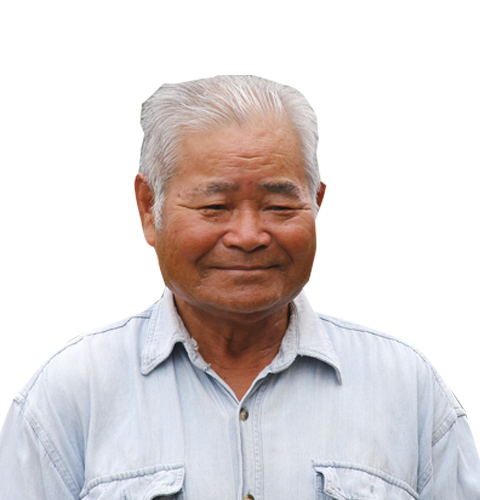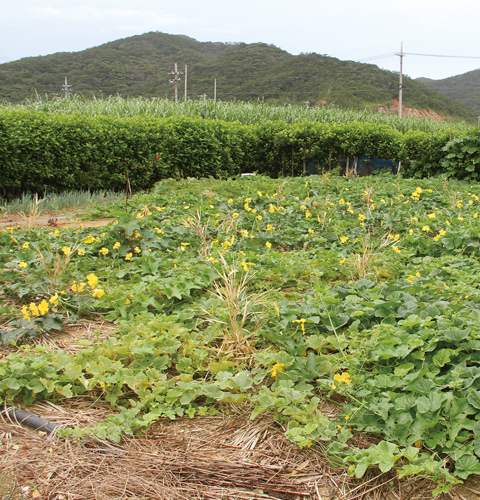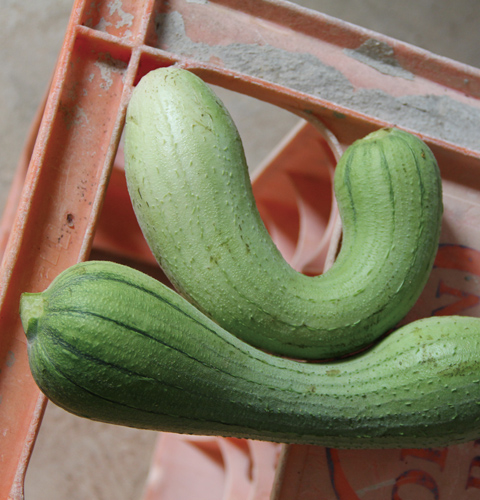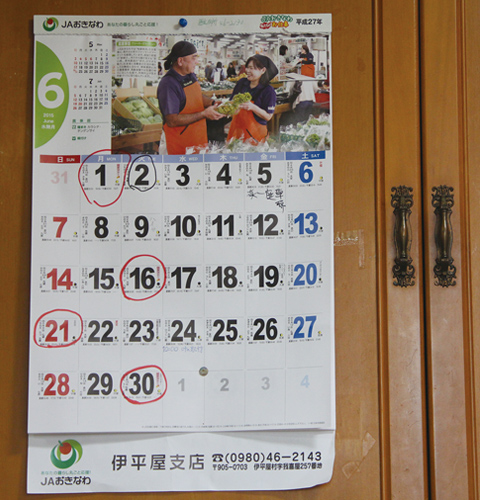P9-P10
For Dana hamlet's chief priest, Saneyasu Kuniyoshi, the local rituals are part of his life. The locals decide who is suitable for their chief priest. "Unjami ", one of the area's holiest rites, also takes an important part the area's tradition.
"Long ago, Kikai Island(*1)'s Noro priestesses took shelter in Iheya from a storm on the way to Okinawa mainland. Once the storm settled, our ancestors saw the Noros off - back on their safe journey. That is the birth of Unjami," explains Kuniyoshi.
He adds, "Unjami is a very important ritual. But, as a chief priest, I have not felt any pressure or worries at all."
Every 1st and 15th of the month in the Chinese calendar, Kuniyoshi makes offerings of fresh tea and food to Dana Shrine. He uses water from Shinjaga(*2) well for the tea.
"We still drink Shinjaga water. To brew tea, yes, all from the well. We have set a pipe and use it," he says.
The residents pitched money in to building a water system from Shinjaga, which still provides water for tea making and livestock's drinking. Dana is famous for rice-farming in Iheya, which should explain the water abundance as shown with Shinjaga well.
Kuniyoshi goes on to explain, "Tuntuku(*3) is a deity of water. On the 2nd of February in the lunar calendar, we utoto(*4) for harvest, and also for rain if dry weather is going for long." These traditions are still deeply-rooted in the lives of the people in Dana.
Kuniyoshi is modest about his age, saying that he no longer does sugar cane farming or rice planting. That's not all true, though. His atei(*5) boasts a good harvest of his home-grown vegetables.
*1 an island north-east of Amami
*2 a well near Dana Shrine
*3 see P8
*4 to pray for
*5 a home garden
Walking around the neighborhood in the hamlet is like my daily exercise!

Saneyasu Kuniyoshi
Dana hamlet's chief priest, responsible for all rituals in the community. His favorite foods are rice and hechima sponge cucumber.

Unjami, a traditional sea rite, praying for Kikai island's Noros' safe journey that takes place on Ahashi beach.
From the top on the searock, oh(*) leaves are thrown into the sea for safe voyage.
*a plant which grows in warm places near beaches


A variety of seasonal vegetables are grown in his atei, Kuniyoshi's home garden in front of the house.

Every 1st and 15th day of the month in Kuniyoshi's Chinese calendar are marked with circles.
Annual Events of Dana Hamlet
A humble prayer in order to survive nature's severity, old customs passed down for generations. There are many rituals like as the harvest festival, since Iheya is a rice-producing island. The most well-known rite is Unjami, the sea festival.
| January | January 2nd Guninto, New Year Ritual Offerings of food are made at the Dana Shrine and Noro Dunchi, as well as for Hinukan and Buddhist altar found in each household. ※ Hinukan: a deity of household, usually placed in the kitchen. Taking care of Hinukan is a women's duty. |
| February | February 2nd of Chinese calendar Tuntuku (ritual for a god of earth),Agricultural Ritual Pray for good harvest at the site of Tuntuku |
| February 15th of Chinese calendar Umachi, Wheat Harvest Ritual Pray for good harvest of wheat. |
|
| March | March 15th of Chinese calendar Umachi, Harvest Ritual of Wheat Grain Celebrate good harvest of wheat. Food and prayer offered at Dana Shrine and Noro Dunchi. Offerings also made at the Buddhist altar in each household. |
| April | April 4th of Chinese calendar Taumi, Harvest Ritual of Rice Conducted after rice planting. Food and prayer are offered at the Dana Shrine and Noro Dunchi. Offerings are also made at the Buddhist altar in each household. |
| May | May 15th of Chinese calendar Umachi, Harvest Ritual of Rice Pray for good harvest of rice. |
| June | June 15th of Chinese calendar Umachi, Harvest Celebration of Rice Celebrate good harvest. Food and prayer are offered at the Dana Shrine and Noro Dunchi. Offerings are also made at the Buddhist altar in each household. |
| July | July 17th of Chinese calendar Unjami, Sea Ritual ※ see previous page |
| July 19th of Chinese calendar Shinugu Boys' Festival, Pray for the healthy growth of boys born within a year from the last Shinugu. |
|
| August | August of Chinese calendar Juguya Harvest Ritual In recent years Juguya has been conducted on August 12th of Chinese calendar in Dana Hamlet. Celebrate good harvest. Prayer and dedication of dance are offered at the Dana Shrine and Noro Dunchi. |
| September | September 3rd of Chinese calendar Nadani Formerly a seeding ritual in olden times. Nowadays, people are notified of the day but no rituals are held. |
| September 5th of Chinese calendar Yamanaji The people of Dana Hamlet clean the mountain and draw a sacred boundary with a rope at the sanctuary in order to keep the site off-limits. |
|
| September 9th of Chinese calendar Yunige Festivity of Longevity Pray for good health, harvest and Yugafu for the community. ※Yugafu: affluence and peace. |
|
| December | Yamagomori Only local women bestowed the honor of being priestesses schedule the Yamagomori, and offer their prayers in the mountains or sanctuaries. |
